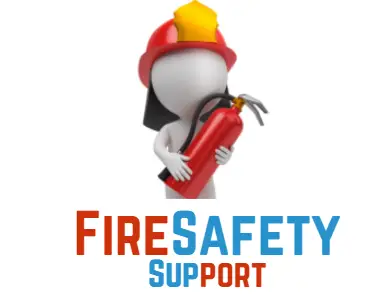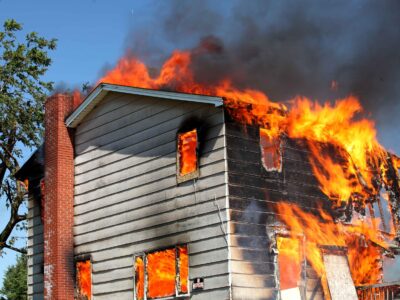Electrical fires are a serious problem in the U.S. home, with more than 2 million fires occurring annually. In fact, it’s one of the leading causes of death in residential buildings which is the reason all homeowners have their homes insured. But the question is does home insurance cover electrical fire? Let us find out!
The good news is that some home insurance policies will cover electrical damage in your home, whether caused by a fire, lightning strike, or other mishaps. However, there are some things you should know about how your policy works and what needs to happen when an incident occurs.
Also, if your policy doesn’t cover electrical fires, you may want to consider getting additional coverage through a homeowners insurance policy or other types of the property insurance policy.
What is home insurance?
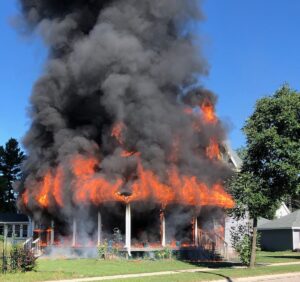
Home insurance is a type of insurance that helps protect your home from damage or loss. It can also help cover you if you need to make repairs after an accident. It is typically purchased as part of a homeowners policy, which is sold by private companies and covers the structure of your home and its contents.
In addition, home insurance covers damage caused by fires, floods, earthquakes (and other natural disasters), accidents, vandalism, theft, and many other causes. The most common types of home insurance are:
Dwelling coverage:
This type of home insurance covers everything inside your home including the structure itself (like walls, floors, and ceilings), items inside the structure like furniture, appliances, and electronics as well as personal belongings like clothes and jewelry.
Personal Liability:
This type of coverage protects you against lawsuits related to bodily injury or property damage you cause while on your own property. If someone slips on ice outside of their own driveway and breaks their leg then this would be considered personal liability coverage.
Property Damage:
This type of coverage protects you against damage caused by acts such as vandalism or theft when it happens on your property or while using it or visiting someone else’s property that they own/rent/lease.
How dangerous is electric fire?
Electric fire can be very dangerous. If you are not careful, you can burn yourself or your home down. It is important to know how to prevent an electric fire before it starts.
The most common way that electric fires start is by having an appliance that heats up too quickly and causes a spark (like your dryer). This in turn will cause an electrical surge through the wall and into your home.
In addition, electric fire is dangerous because it can cause severe burns and burns to the face, hands, and eyes. These injuries can be fatal, so it’s important that you take the time to learn how to safely operate your home’s electrical system. If you have an electric fire in your home, call 911 immediately.
Read:: How Hot Is A House Fire?
Common causes of electrical fire at home
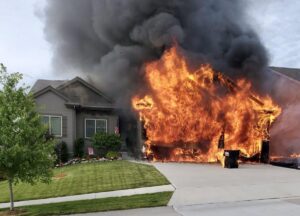
There are several common causes of an electrical fire at home that you should be aware of. One of the most common causes of electrical fires is faulty wiring. The wires can become frayed and damaged, or they may become exposed to water. This can lead to a short circuit and an explosion, which is what we’re talking about here.
Additionally, outlets that have been left unplugged for long periods of time can overheat and cause an electrical fire. This happens when the electric current gets too high for the outlet to handle it. It’s important to keep your outlets unplugged whenever you’re not using them so that they don’t become too hot to touch.
Below is the list of the most common causes of electrical fires are:
- Improperly wired or defective wiring
- Damaged electrical components (e.g., fuses)
- Lack of maintenance on equipment such as appliances and lighting fixtures
- Improper use of extension cords
Can electrical fire destroy a home totally?
Electrical fires can destroy a home, but it depends on the severity of the fire. If your home is fully engulfed in flames, there’s not much you can do except get out of your house. If the fire is at a manageable level and the smoke has cleared, you may still be able to salvage some things from your home if you act fast.
If you smell something burning nearby, call 911 and leave immediately. Do not try to extinguish or contain any flames or other hazards yourself; if you do so, it could lead to serious injury or death.
Read:: How Hot Is Fire From A Lighter?
Does home insurance cover electrical fire?
Home insurance does cover electrical fires. However, it’s important to note that not all home insurance policies cover electrical damage. You need to make sure you’re covered by your policy and that you have the right amount of coverage.
To find out if it is or not, the best thing you can do is contact your insurance provider and ask them what they cover. They may have a special policy that pays for repairs if you have an electrical fire in your home.
What type of fire is covered by the homeowners policy?
The kind of fire that you’re covered for depends on the type of policy you have. If you have a basic homeowners policy, then it does not cover fires that occur in your home. Basic policies generally do not cover damage caused by any form of water, including flooding and downpours. If your home is equipped with smoke detectors, then they will also be covered.
If you have a more comprehensive policy, then you may be able to file a claim if your house is damaged by fire. In addition to covering the house itself, this type of policy also covers things like its contents and other property within its walls (such as antiques).
If your house has been destroyed by fire but all of its contents were saved from being destroyed by water or heat, then they will likely be covered as well since they were saved from destruction.
Difference between homeowners insurance and property insurance?
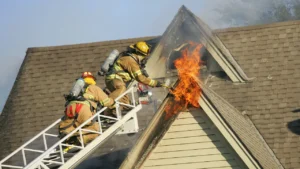
Although homeowners insurance and property insurance are often confused with each other, they actually have very different purposes.
Homeowners insurance protects your personal property from damage or destruction by people who have permission to enter your home. It covers things like:
- Your car
- Your furniture
- Your building
Property insurance protects your personal property against accidental damage, such as getting hit by lightning or having a tree fall on your house.
How to prevent electrical fire damage in homes
We’ve all heard horror stories about electrical fires like the ones that start in your home and leave you with a bill for thousands of dollars to replace everything from your appliances to the drywall. But what if there was a way you could prevent this from happening?
Here are three tips for keeping your home safe:
1) Know where all of your outlets are. If you don’t know where they are, it’s easy for someone to trip over them and get hurt, or worse, start a fire. Make sure that everyone in the house knows exactly where they are so that no one has to ask anyone else before using them.
2) Use extension cords sparingly. Extension cords can be dangerous because they aren’t designed to carry as much current as an actual circuit breaker would be able to do. So, make sure you’re only using them when necessary.
3) Keep it dry as you don’t want anything on top of water-soaked carpet or up against walls where water could drip down onto electrical wiring or pipes as that could cause fires even worse than usual.
4) Install smoke alarms on every level of the house, and replace them every 10 years. Make sure that batteries are working properly, and test them monthly.
5) Keep electrical outlets clear of dust and debris, especially if they are near woodwork or carpeting.
What can you do during an electrical fire occurrence?
When an electrical fire occurs, the first thing you should do is turn off the power. This will prevent any damage to the electrical system or other property. You should also call 911 and notify your neighbors that there is a fire nearby. If you are unable to turn off the power, you can use a fire extinguisher to put out the flames.
In the event that there is a fire in your home, stay away from it until emergency personnel arrives on the scene. Do not put yourself in danger by trying to extinguish the fire yourself, as this can be very dangerous if there are any electrical appliances involved.
Also, if you’re able to get close enough to see what’s going on, try to grab any important personal documents or important items that might be needed by emergency personnel when they arrive on the scene.
Who should you call during a home electrical fire outbreak?
In the event of a home electrical fire outbreak, it’s important to know who to call. The first thing you should do is call 911. Although you may be able to extinguish the fire yourself, you’ll want to make sure that no one is in danger and that your family’s safety is taken care of. You can also call your local fire department for advice on what to do next.
The second person you should contact is your insurance company. You’ll need to file a claim with them so they can help cover any costs associated with the incident. They will also help determine if there was any liability on your part that resulted in damage or injury to others (such as by using faulty wiring).
Conclusion
This post on does home insurance cover electrical fire reveals all that you need to know about insuring your home and preventing fire issue in your home. Electrical fires happen when there is a short circuit or an overload in your home, which causes the electricity to heat up and burn you. If you have an electrical fire, it’s important to act quickly so you can prevent the fire from spreading and causing more damage.
